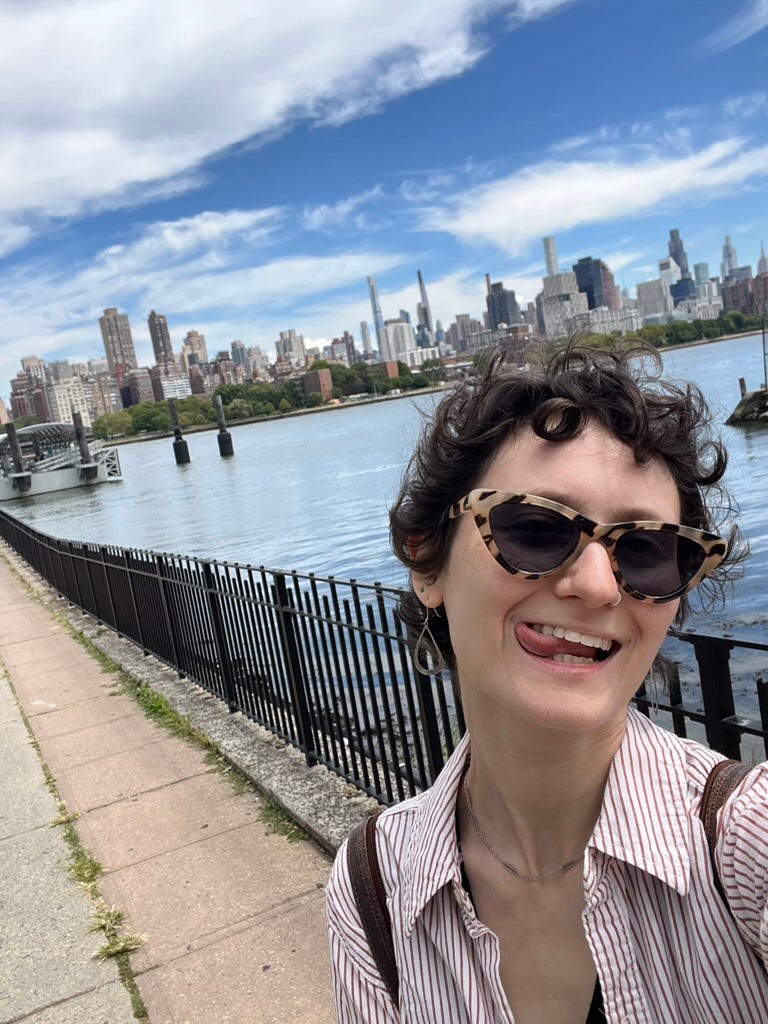There are a lot of new faces here — welcome!! I’m filled with gratitude in my belly that close to 1,500 of you are helping me reach my goal of a world where individuals managing chronic illness have their emotional needs fully seen, honored, and supported.
Share with a friend who should be here too.
I’ve been thinking a lot about overthinking (lol).
What’s funny is I couldn’t really examine the role it played in my life until I wasn’t an avid overthinker anymore. Until I was no longer caught in that endless web of connected thoughts, without a single moment to just be, to let my mind breathe. We often cannot see ourselves clearly in the moment, and it’s hindsight that brings clarity.
For most of my life, overthinking was a safety mechanism. It felt like protection. Like if I thought enough, I could keep bad things from happening or make the unknown feel less unknown.
Neither of those beliefs is true, of course. We can’t predict or control life through thinking. And while thinking can help us process and plan, it can also become a way to avoid feelings, risks, or uncertainty. Like any habit, there’s a middle-ground—a place where we can stay present while still planning enough to stay grounded.
As I took the plunge to move to NYC last week—a risk I had been debating for a year seriously, but close to a decade in the secret crevices of my mind—I realized:
wow, I don’t think I’m an overthinker anymore.
I still catch myself in the overthinking spirals from time-to-time, but the key difference is that I can catch myself. And I have the mindful awareness, and the self-compassion to match the catch.
what does overthinking look like?
Overthinkers often struggle to move from thoughts into action. This can look like indecision, rumination, anxious spirals, or just a busy-bee mind. For many of the chronically ill clients I work with in particular, overthinking often comes with a disconnection from the body as well. When inhabiting your body feels uncomfortable, or even unbearable, overthinking acts as a way to push your body’s warning signals or symptoms aside so you can keep going: show up to work, take care of family, keep up appearances with your partner and friends.
If you’re reading this and identifying as an overthinker… that’s ok! It’s allowed! There’s a reason you developed this protection, just like I did.
As always, my writing and content are for awareness, not criticism. You are accepted and acceptable and lovable as you are today.
And as I reflect on how overthinking has shaped my own life, and as I see it over-and-over as a trauma response for many individuals with chronic conditions, it’s become clear to me that overthinking is an important topic for me to write about. Both from my personal experience and from my perspective as a psychologist, I want this community to feel seen and supported in navigating it.
quick announcement break
The “Ask Dr. Talia” submission form is now completely anonymous! Looking forward to your questions about managing the emotional impact of illness.
ICYMI: Ask Dr. Talia #1: Should I accept my illness?; Ask Dr. Talia #2: What if no doctor ever believes me?; Ask Dr. Talia #3: How do I grieve my life due to illness?; Ask Dr. Talia #4: How do I manage illness while working?
3 reasons overthinking feels safe
Contrary to the beliefs of overthinkers, overthinking can actually hinder effective decision-making by stalling aligned action and fueling perfectionism. Unsurprisingly, overthinking is also linked to symptoms of anxiety, depression, and PTSD.
So why do we overthink? Not because it’s a fun walk in the park on a sunny day. Overthinking serves a purpose. It often gives us a sense of safety, a way to feel some control, protection, and steadiness in the face of uncertainty.
Here are three ways it shows up:
Overthinking allows you to air out your anxieties. If anxiety wants anything, it’s to have airtime in your brain. Overthinking gives it that space by running through all the possible outcomes instead of staying present and seeing what actually happens. It can make you feel prepared and protected, but it also drains a lot of energy.
Overthinking lets you “plan for” emotions. If you’ve ever been overwhelmed by negative emotion (most humans…), then you may have developed a strategy of anticipating how you’ll feel in the future. Overthinking lets you test-drive what it would feel like if a situation didn’t go as you’d like, creating an illusion of emotional safety.
Overthinking enables you to replay the past. Ever had a regret? Replayed something you said? Wished an interaction went differently? Overthinking allows you to “stay present” in past moments you deeply wish you could change, tricking your brain into believing the outcome may shift to something that feels safer. Unfortunately, you can’t change the past, and in staying there, you often miss out on the present.
Reflection for you: Which of these reasons for overthinking resonate for you? How does overthinking show up in your life? How does it serve you? Let me know in the comments.
how i’m moving forward
So as I adjust to a new city, and a new life, and I notice myself drifting back into old overthinking patterns in order to quell the anxiety, I keep reminding myself: One day at a time, Talia. One day at a time, my love.
It’s not profound. It’s not new. It’s not an insight that will instantly change the way you view the world as you finish this post and move on with your day.
But profundity isn’t always about novelty—sometimes it’s about returning to tried-and-true wisdom again and again, as many times as you need.
True wisdom is giving yourself grace and compassion when old patterns resurface, instead of rushing to dismiss your growth and progress.
Since emerging from my overthinking cocoon, I notice so much more joy in my body, gratitude for my surroundings, and presence in my relationships. Life feels more vibrant and full of awe. And now, with this perspective on thinking as my compass, I can always direct back to the present moment when I feel off track.
So if you too are going through a time of upheaval, and you notice yourself overthinking, I offer you the same mantra:
One day at a time, my love.
Sending lots of love for joy and healing always <3,
Dr. Talia
More ways to connect with me:
🌻 1:1 coaching — supporting the overthinkers, recovering perfectionists, and type-A overachievers to access daily joy, connect safely with their bodies, cultivate deep self-trust, and accept themselves and their lives, illness included.
🌻 Consulting — with mission-driven startups, companies, and nonprofits that promote physical and mental wellbeing
🌻 Training and webinars — for therapists and medical professionals working with chronically ill clients
send questions to drtaliaphd@gmail.com.
Want to find me other places?
on instagram; meditate with me on aura health; my website
Some previous posts you may enjoy:
5 ways mistrusting your body shows up in your life; are you sending your body mixed messages?; 10 ways to measure chronic illness progress beyond symptom improvement






I'm absolutely an overthinker and I'm well aware that it comes from growing up never feeling safe, so I am always hypervigilant and waiting for the other shoe to drop.
I was just thinking about this yesterday and today, actually - I don't allow myself to let others support me, to relax or to feel joy because it feels too vulnerable and unsafe.
I'm always too afraid that it will just open me up to getting hurt, rejected, abandoned or let down again.
I know it’s just a movie but when you described the different ways of overthinking I just thought about anxiety in Inside Out 2. How she had that laptop of alllll the possible scenarios. Thought it was better to review all that and without it at first she thought everything was doomed😭😭😭